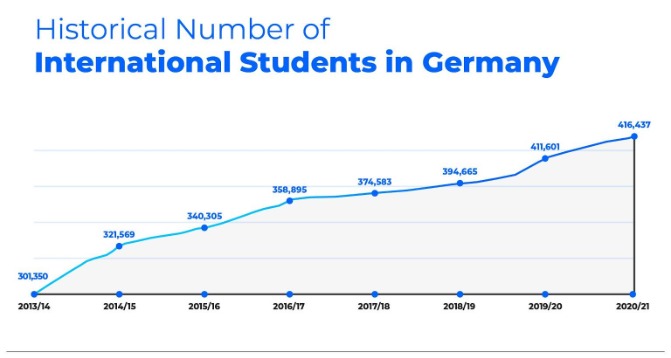
Do you know that there is a country that provides free education? It is Germany‘s educational institutions that charge 0 tuition fees!
To trace back the origin, let us see some interesting facts. The 1971 educational reform legislation allowed Germany’s social democratic party to guarantee the elimination of tuition costs and to set up a system of state-funded financial assistance.
It was formally sealed in 1976 by a law that stopped charging for higher education. The final stronghold, Lower Saxony, eventually abolished its tuition in 2015 after several years of educational changes.
Therefore, by implementing this policy, students from both domestic and foreign places can now conduct their undergraduate studies in Germany, with just the “essentials” that are spread out across each semester needing to be paid for.
The basis of the German free education policy is the recognition and acceptance that every resident or citizen has a fundamental right to free education. Furthermore, it ensures that Germany is constructed with a workforce that is structured in relation to the many tiers of the economy.
Additionally, it draws international students, fostering interchange, human tolerance, and cultural plurality. This is a global perspective that enriches the increasingly interconnected world in which we currently live.


If you are an EU applicant—that is if you are traveling to Germany for study and are from Norway, Switzerland, Iceland, or Liechtenstein—you do not require your German student visa because it will be issued upon your arrival in Germany and you will notify the authorities at any point of entry.
For this reason, there is a fee associated with each application or Individually only in euros.
Citizens of any of these nations do not need to get a visa to study in Germany. On the flip side, only two weeks after arrival will you have to register in your Residents’ Registration Office and the Aliens’ Registration Office (Ausländeramt), while obtaining a residence permit (Aufenthaltserlaubnis).
The list of countries mentioned above would only require you to apply for a German student visa if you intend to work before, after, or even during completion.
In this situation, one should apply for a visa in their country through the locative embassy or consulates of Germans and make it a point to make their way down there much earlier here for you ask.
Both visa holders and non-visa holders will also have to apply for a residential permit within two weeks of arriving. The Taiwanese students should have a passport where he or she has to write his or her identity card number.
The same case applies to students who are from any other country that is not mentioned above and in this case, you will necessarily need a German student visa.
You can apply for this in your country’s local German embassy/consulate. The usual cost, if you review the costs for a visa is €60.
Almost 300 universities in Germany do the good deed of training amazing-minded students in 1000 + courses. However, some private universities charge some tuition fees.
For example, the state of Baden-Württemberg has allowed public universities to impose tuition fees on non-EU/EEA students since 2017.
1. University of Cologne
One of the earliest foundations was built in the city of Cologne, Germany, by the University of Cologne, which was established formally back in 1388.
As a major regional research university and one of Germany’s top universities, it is highly reputed for quality education.
This was the sixth ancient Central Europe university. It was closed in 1798, but it reopened after a century and a half – restored to ensure that the memory of their noble endeavors towards education will never die out.
2.Ludwig-Maximilians-Universitat Munchen
LMU boasts a long history that stretches back to its establishment in 1472 and has spread worldwide since then as it has ranked among the best academic and research institutions in Europe.
Throughout its time, it has become a destination for resplendent scholars and talented students from different parts of the world.
This diverse and dynamic community guarantees that LMU stays ahead of the in-training innovational minds in the continually progressive world.
3. Goethe University Frankfurt
Goethe University Frankfurt, one of the best educational establishments and a member of world-leading research universities, offers a wide variety of programs.
What it boasts is that it is devoted to developing a multi-disciplinary perspective in overcoming complex problems in many ways honored after the legendary Goethe- a Frankfurt polymath for his genuinely noble lit science and philosophy contributions still holds tightly visited bis achievement ideals as one of the world’s best universities.
4. RWTH Aachen University
Created in 1870 by the Aachen Act, RWTH Aachen University is a prestigious German public university located in Aahren, North Rhine-Westphalia, Germany. Known also as the Rhine-Westphalia Technical University of Aachen, or shortened to TU Aachen and further on referred to in such forms AACTH– RWH/AACH; UA or Rheinisch-Westfälische Technische Hochschule Aachen, it has managed for itself an appreciation through these names.
5. University of Münster
A renowned public research university based in Münster, North Rhine-Westphalia, Germany, the University of Münster is a well-recognized institution that imparts knowledge
With over 43,000 students who are studying from more than 120 programs available in fifteen departments and taking the title of Germany’s fifth largest university, it is also recognized as.
Additionally, the University of Münster constitutes a leading focal point of German intellectual life, which does not fail to contribute a notable amount to building the country’s scholarly and research efforts.
Bottom Line
With your willingness to learn a new language and explore, you will find yourself surrounded by numerous opportunities in the peaceful towns of the country. With the scholarship opportunities in Germany offering free education, there’s so much to discover here and build a great career.
With TeachWell, all your study abroad dreams will come true in the right way. Join us to resolve your queries and give yourself the opportunity to shine bright like the star you are.
It may or may not be true, depending on the university. Many undergraduate programs use German as a teaching medium. So, you are required to submit proof that you know German. But, for Masters and Doctorate programs, there are English medium facilities for teaching. However, IELTS and TOEFL are required to show how trained you are in English.
It is different for different countries from where you are applying. Also, it depends on what time of the year it is. It is best to be safe and apply at least three months before the date you are going to Germany.
There is an enrollment fee for confirmation purposes. It is usually 250 € approximately per semester. Also, if you are applying for transport from your stay to the institution, then an optional semester ticket fee is needed. Also, if the time for which you are staying in Germany to study is more than the course time of 4 years, an extra fee of 500 € is needed.
@Copyright 2023 Teachwell all rights reserved
WhatsApp us